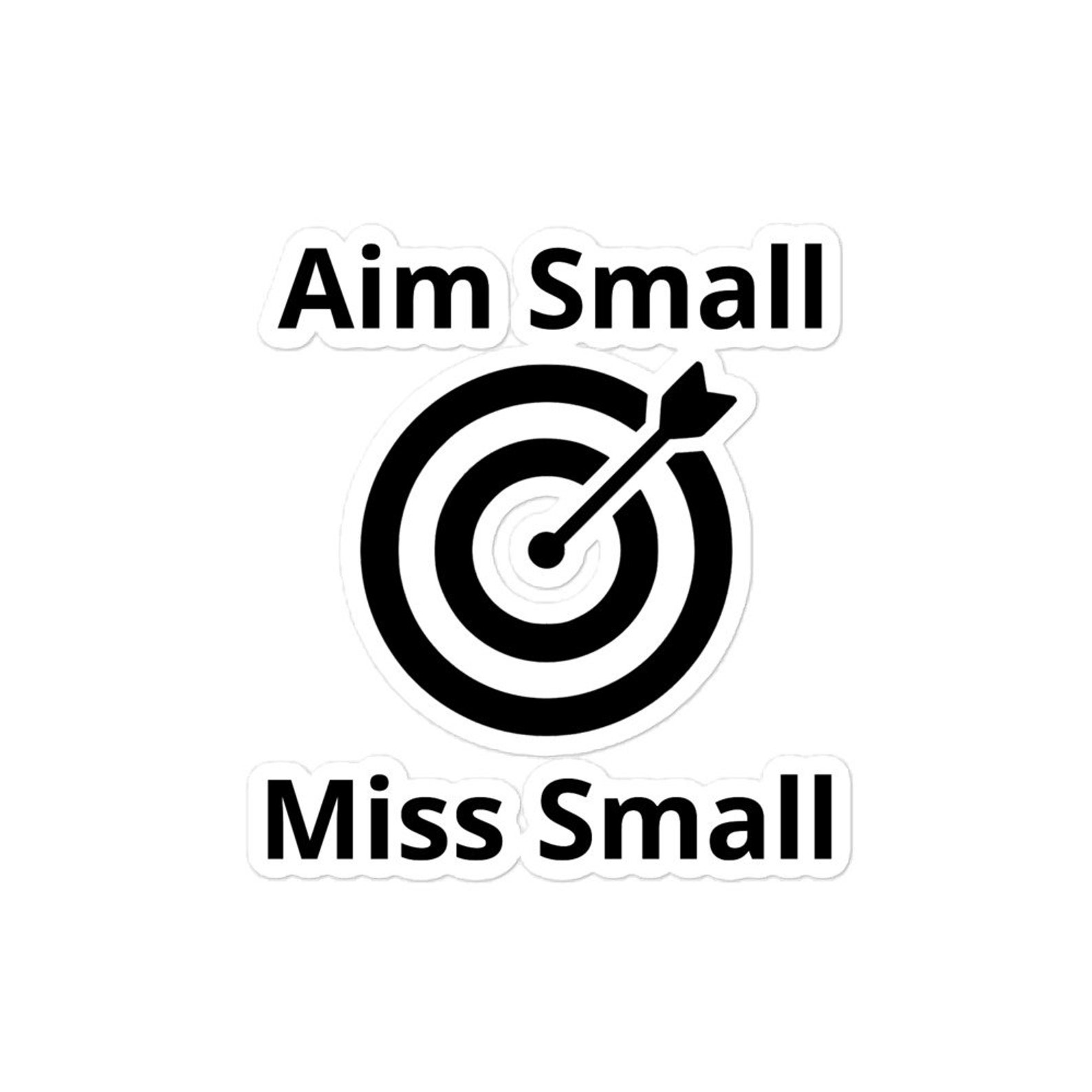Have you ever set a massive goal, only to find yourself overwhelmed and defeated before you even started? It’s a common experience, and it’s something I’ve struggled with for years. I’d dream of accomplishing huge things, but the sheer enormity of the task would paralyze me. I’d spend hours making ambitious plans, only to abandon them after a few days. It felt like I was constantly chasing a moving target, never truly making progress.

Image:
Then, I stumbled upon the concept of “aim small, miss small.” It was a simple idea, but it was a complete game-changer for me. Suddenly, I realized that focusing on small, achievable goals was the key to unlocking my potential and actually making progress towards my larger aspirations.
Why Big Goals Can Be Overwhelming
The pressure of achieving big goals can be incredibly daunting. When we set our sights on something massive, we’re often setting ourselves up for failure. The sheer weight of expectation can be crushing, leading to procrastination, self-doubt, and ultimately, giving up altogether.
Our brains are wired to avoid pain, and the potential for failure can feel like a huge, looming threat. We might even subconsciously sabotage our efforts to avoid the emotional discomfort of not reaching our goals. This is why it’s crucial to break down large goals into smaller, more manageable chunks.
Aim Small, Miss Small: A Powerful Strategy
The “aim small, miss small” approach is all about making incremental progress towards your larger goals. Instead of focusing on the end result, you concentrate on achieving small wins along the way. This strategy offers several key advantages:
1. Increased Motivation
Achieving small goals is rewarding. It provides a sense of accomplishment and encourages you to keep going. This positive feedback loop boosts your motivation and makes the journey less daunting. When you see progress, you’re more likely to stay committed to your long-term goals.

Image:
2. Reduced Fear of Failure
Smaller goals carry less risk. If you miss a small goal, it’s not a huge setback. You can learn from the experience, adjust your approach, and keep moving forward. This reduces the fear of failure and allows you to experiment, explore different strategies, and ultimately grow.
3. Improved Focus
Focusing on small goals helps you stay focused on the task at hand. Instead of being overwhelmed by the vastness of your larger goals, you can concentrate on the specific steps you need to take to achieve your current objective. This laser-like focus allows you to make significant progress without feeling bogged down.
4. Enhanced Learning
“Aim small, miss small” encourages experimentation and learning. You’re not afraid to try new things, knowing that even if you don’t achieve your goal, you’ll still gain valuable insights and experience. This continuous learning process helps you refine your skills, strategies, and approach to eventually achieve your bigger dreams.
Applying Aim Small, Miss Small in Your Life
Here’s how you can implement the “aim small, miss small” approach in your daily life:
- Break down your goals: Instead of aiming for a massive weight loss goal, focus on losing 1-2 pounds per week. Instead of writing a novel, set a goal to write 500 words a day.
- Celebrate small wins: Take the time to acknowledge even the smallest achievements. This reinforces the positive feedback loop and motivates you to keep striving.
- Don’t be afraid to adjust: If you miss a goal, don’t beat yourself up. Analyze what worked and what didn’t, and adjust your strategy accordingly. This iterative process is key to long-term success.
- Focus on the process: Enjoy the journey. Instead of obsessing about the end result, focus on the progress you’re making each day. Embrace the challenge and enjoy the growth you’re experiencing.
FAQs
Q: What if I’m not making progress even with small goals?
It’s important to be realistic about your capabilities. Start with even smaller goals and gradually increase the difficulty as you progress. If you’re still not seeing results, consider seeking professional guidance or support.
Q: How do I know if I’m aiming too small?
If you’re consistently hitting your small goals without any challenge, it might be time to increase the difficulty. Finding the sweet spot where you’re challenged but not overwhelmed is key to sustained motivation and growth.
Q: Can I use this approach for any goal?
Yes, this approach can be applied to any goal, from personal development goals to career aspirations, fitness objectives, or creative endeavors. The key is to break down large tasks into manageable steps and focus on making progress every day.
Aim Small Miss Small
Conclusion
By adopting the “aim small, miss small” approach, you can overcome the overwhelming feeling of big goals and unlock your potential for success. The power lies in focusing on small, achievable wins, celebrating progress, and learning from your mistakes. So, take a deep breath, set your sights on a smaller goal, and enjoy the journey of achieving your bigger dreams.
Are you interested in learning more about goal-setting and achieving your dreams? Share your thoughts and experiences in the comments below!






